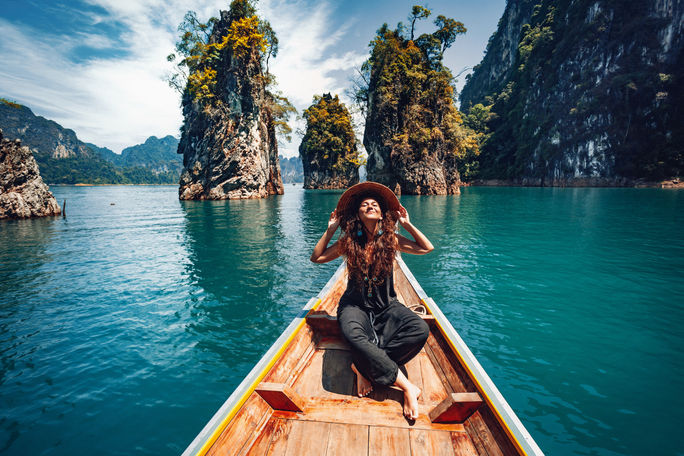
Two decades ago, travel inspiration and information often came from the pages of a Fodor’s guidebook or flipping through a glossy travel magazine.
Those were far simpler days in the travel industry.
Today, social media and Instagram in particular (not to mention the ubiquitous Instagram travel influencers) exert a profound influence over nearly every element of the travel industry and every step of the travel planning process.
From the consumer perspective, social media not only guides and inspires decisions about where to go and what to do, but even influences how to dress while on vacation. It’s hard to ignore or deny the global domination IG has managed to exert over consumer travel.
As for travel businesses and brands, being on Instagram and working with influencers has become an integral part of reaching audiences.
But before Instagram, of course, there was Facebook.
And February 2024 marks the twentieth anniversary of what was arguably the first wave of social media’s influence on the travel industry.
Created by then Harvard student Mark Zuckerberg to offer a free way to keep in touch with college friends, Facebook quickly grew into a behemoth. And while the user base has shifted to a different and perhaps older demographic in recent years, the platform still has a staggering 3 billion monthly users.
The content on Facebook has also evolved significantly since the platform was first brought to life in 2004. Today, it emphasizes ad revenue and data collection, rather than simply helping users connect with friends for free, as was Facebook’s initial value proposition.
Those changes, however, are just a small part of Facebook’s evolution story. Over the course of 20 years, Facebook has also profoundly influenced the travel industry, impacting both consumer behavior and the way industry players reach and communicate with their target audiences.
“It has definitely changed the landscape,” Erin Whitlock Brown, social media manager for Valor Hospitality Partners, tells TravelPulse. “I don’t think anyone from any industry realized that Facebook would have the impact it has had. Twenty years ago many businesses weren’t even sure they wanted to include Facebook in their marketing plans. Now it’s a key market.”
In recognition of Facebook’s two-decade anniversary, TravelPulse reached out to travel industry insiders and business owners to discuss the platform’s early days and its evolution into a force to be reckoned with.

Facebook has democratized the information gathering process in travel planning. (Photo Credit: Courtesy AdobeStock)
Democratized Information Sharing
Perhaps the most revolutionary aspect of Facebook early on was the ability for consumers around the country – and later the world – to share information and images about their travel experiences in real-time and have conversations with each other about those experiences.
Peter Hamdy, founder of the family-owned and operated travel company Auckland & Beyond Tours, calls Facebook a game changer that’s made it far easier to connect with fellow travelers and obtain first-hand insights and on-the-ground information.
“With just a few clicks, we can access a treasure trove of travel inspiration and recommendations from fellow travelers,” Hamdy tells TravelPulse. “For example, I remember a time when I was planning a trip to Thailand. I turned to Facebook travel groups and asked for recommendations on the best local food markets in Bangkok. Within minutes, I received responses from fellow travelers who had visited the city before.”
These travelers, says Hamdy, readily shared the details of their favorite food haunts, must-try dishes, and even insider tips on how to navigate the bustling markets.
“Thanks to their recommendations, I was able to plan my itinerary and experience the local culture in a way that I wouldn’t have been able to without social media,” Hamdy adds.
Not only did this type of information sharing via Facebook travel groups serve to democratize travel, but it also made it easier for travelers to learn about historically under-the-radar locations and offerings, says David MacDonald, owner of ExperienceSkye, a travel information platform that helps travelers plan trips to the remote isle of Skye, in Scotland
“Guests now have far more access to insider information than ever before and can find unique experiences off the beaten path, especially in places like Skye,” says MacDonald. “This fostered a culture of independent exploration and authenticity, with expectations shifting towards unique experiences and personalized itineraries.”

Facebook has also made the travel process more transparent. (Photo Credit: Courtesy AdobeStock)
Increased Travel Experience Transparency
The free flow of information that began taking place via Facebook travel groups and user posts also had the benefit of allowing consumers to obtain unfiltered opinions and reviews about hotels, restaurants, destinations, tours, and more.
Indeed, Whitlock Brown says consumers began turning to social media channels like Facebook to conduct research during the consideration stage of their travels.
And they spend a dedicated amount of time combing such platforms to find user-generated content (UGC) and videos sharing everything from the look and feel of a hotel’s guest room to recommendations about the best cocktails and menu items at the property’s restaurant outlets, down to checking the type of amenities offered in the fitness areas.
All that UGC has been a boon for savvy consumers who spend time doing their homework.
“Behind-the-scenes real-time posting of user-generated content fosters trust and transparency, shaping expectations around service quality, authenticity, and value for money,” says MacDonald. “Facebook allows visitors to ‘dip their toe in’ in order to see what experiences might be like.”

Facebook helped bring about the era of travelers making decisions based on photoworthiness of destinations (Photo Credit: Courtesy AdobeStock)
The Beginning of the Photoworthy Era
Yet another reality brought about by the arrival of Facebook (and to a larger extent Instagram later on) is travelers increasingly making travel booking decisions based on how their globetrotting will appear on social media.
More and more travelers are seeking vacations in visually stunning locations and are looking specifically for photo-worthy moments that can be documented and shared, say experts.
“It’s not just about booking trips; it’s about crafting unique, unforgettable experiences,” says Jim Campbell, CEO of Honeymoons dot com. “When a couple comes to us, often their ideas are fueled by the enchanting images and stories they’ve encountered on social media. They don’t just want a honeymoon; they want a journey that’s as picture-perfect and share-worthy as the ones they’ve seen online.”
Engagement Tool for Travel Brands
While travel brands and businesses may not have initially known what to make of Facebook when it arrived on the scene – or how to incorporate it into their advertising or marketing plans–that has changed dramatically over the years.
The platform has become a powerful tool for hotels, resorts, and other hospitality businesses to connect with their audience and showcase offerings.
“It has revolutionized the way businesses market themselves and engage with potential guests,” says Hamdy. “I’ve seen many hotels leverage Facebook to create immersive experiences for their guests even before they arrive. They share stunning photos and videos of their property, highlight unique amenities, and provide a glimpse into the local attractions.”
Facebook also allowed brands and destinations to share authentic stories and consumer-generated content, thus connecting with still more potential travelers and future guests on an emotional level before they even arrive.
Equally importantly, Facebook opened up a new avenue of direct communication between guests and businesses. Using its messaging tools, consumers were soon able to reach out to hotels around the world and ask questions or make special requests.
“This level of accessibility and personalization has greatly enhanced the guest experience,” says Hamdy.

Facebook has helped provide deeper insights about what travelers want. (Photo Credit: Courtesy AdobeStock)
Window Into Traveler’s Dreams
Travel is of course, and always has been, aspirational. It’s an opportunity to experience something beyond the humdrum of daily life. And the data Facebook provides travel companies and brands via marketing and advertising insights, has created a deeper understanding among the industry of what consumers are daydreaming about and really want.
“From a business standpoint, Facebook and other platforms have…given us a window into what today’s couples dream of for their honeymoon,” says Campbell. “Each post, each ad, each review helps us tailor our services more precisely and reach out to clients in a way that’s both meaningful and personal.”
“Social media has not just changed how we market; it’s changed how we relate to our clients and understand their dreams. It’s a powerful tool that helps us turn those dreams into reality,” Campbell adds.

Travel advisors have also used Facebook to their advantage. (Photo Credit: Courtesy AdobeStock)
Inspiration Engine for Travel Advisors
Travel advisors have also learned how to use Facebook to their advantage over the past two decades. Rather than eliminating advisors from the equation by making troves of information available through Facebook travel groups and travel influencers, advisors have found their own unique ways to drive business via the social networking site.
“Facebook is an inspiration engine for many [advisors],” says Alex Sharpe, president and CEO of Signature Travel Network. “I think sharing insights on how best to experience things is inspiring, and it helps bring customers to travel advisors.”
Many of Signature Travel Network’s advisors utilize Facebook to share destinations, new products, and offers. But Facebook’s most powerful value for advisors comes from travelers themselves showcasing special travel experiences they’ve had on the platform. Especially when that experience was “unlocked” by the expertise of an advisor.
“An example would be a traveler sharing a photo of the Trevi Fountain in Rome,” continues Sharpe. “Perhaps it seems like a completely candid photo but, in reality, the traveler’s advisor set them up with a professional photo shoot early in the morning — before the crowds — or got them access to a balcony that sits right in front of the fountain where they can spend an hour sipping coffee or Rosé.”
Inspiration comes not only from the destination itself, but how someone experienced it differently thanks to an advisor’s expertise, says Sharpe. And Facebook provides an opportunity to share that story far an wide, in ways that were simply not possible before the social media platform’s existence. “Travel is a storytelling business and social media gives many folks the canvas to do just that,” says Sharpe.
Facebook’s Continued Relevance
While Instagram may have stolen much of Facebook’s thunder in recent years, Zuckerberg’s creation continues to remain relevant. Whitlock Brown, of Valor Hospitality Partners, says Facebook still offers travelers the value it did two decades ago: A transparent look at the travel experience.
“Travel articles may provide some information that’s good to know, but on social media you get a more authentic look into a travel experience from other consumers,” she explains.
What’s more, Facebook (unlike Instagram) allows for greater character count and information in its posts. It’s not limited in the same way as Instagram, which also does not allow user-friendly clickable hyperlink in posts.
“There’s less barrier to entry on Facebook when leading users,” Whitlock Brown explains. “On Facebook, you can include a booking link or a link to the property’s website or some other area to gain more information about the property or the city.”
“I don’t think Instagram put a dent in Facebook,” Whitlock Brown adds. “Instagram offers immersive photos of what I saw and the food I experienced. Instagram is a visually rich medium where you can get those great photos and learn more about the visitor hotspots. But if you want to read more about these places and get a more in-depth idea of city or hotel, Facebook is still great.”
For the latest travel news, updates and deals, subscribe to the daily TravelPulse newsletter.


